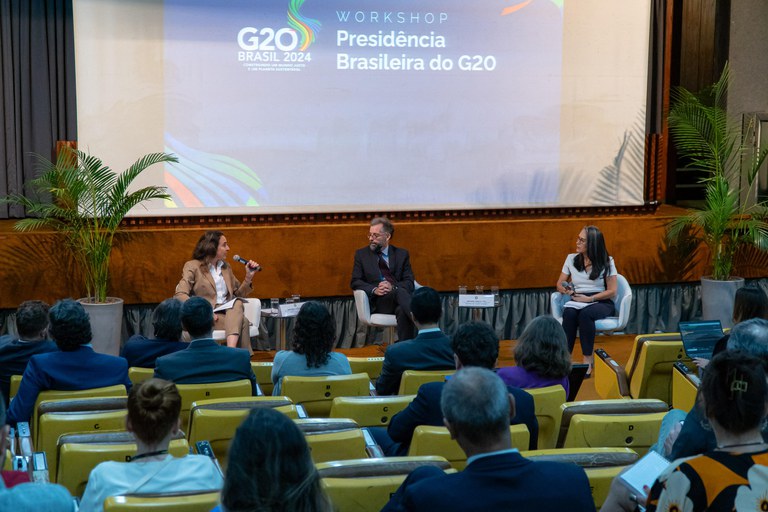Notícias
FOREIGN AFFAIRS
Brazil’s G20 presidency: international cooperation priorities and challenges

SECOM explained that Brazil's role as president of the G20 will highlight issues that are a priority to the Brazilian government: combating hunger, poverty and inequality; sustainable development; and global governance reform - Credit: Diego Campos/SECOM
This Wednesday, November 22, the Brazilian Presidency’s Social Communications Secretariat (Secretaria de Comunicação Social da Presidência da República/SECOM) held a briefing for the national and international press about Brazil's upcoming G20 presidency. As of December 1, the country will take on the leadership of the grouping for one year.
The G20 brings together heads of State and Government from the world's main economies to discuss important global issues that are linked to international economic cooperation.
It is the first time that Brazil has occupied the position in this format; in 2008, it presided over the G20 at ministerial level. The resumption of Brazil's leading role on the international stage, however, highlights the Brazilian government's priority issues to be addressed at the summit: combating hunger, poverty and inequality; sustainable development; and global governance reform.
More than 100 meetings –– both in person and virtual –– of the working groups and task forces that make up the G20 have been planned for the Brazilian mandate, at technical and ministerial level, in host cities across the five regions of Brazil. The highlight will be the summit that will be held in Rio de Janeiro on November 18 and 19, 2024.
WORK AND TOPICS – The G20 works differently from traditional international organizations, and according to two parallel workstreams: the Finance Track and the Sherpa Track.
The Sherpa Track is led by the personal emissaries of G20 leaders, and oversee negotiations, discuss the points that form the summit's agenda and coordinate most of the work. The sherpa appointed by the Brazilian government is Ambassador Mauricio Lyrio, Secretary of Economic and Financial Affairs at Itamaraty (Brazilian Ministry of Foreign Affairs).
According to Lyrio, Brazil is very well positioned to hold the G20 presidency because it has an excellent relationship with all the other participating countries. "We have the capacity to guide a presidency based on results. One of our projects for the period is the creation of a Global Alliance Against Hunger –– in a world that has developed in so many ways but in which 1/10 of the population have no fundamental and structural access to eating regularly. To us, this is a priority," said the Ambassador.
The Finance Track deals with strategic macroeconomic issues and is led by member countries’ Finance ministers and central bank chairpersons. The coordinator of the Finance Track is economist and diplomat Tatiana Rosito, Secretary of International Affairs at the Ministry of Finance.
"Brazil has a special role; it is an opportunity for the country to advance the vision of globalization alongside solidarity, and to seek to reach a consensus in certain fields in which it can offer solutions –– such as climate change, for example," said Tatiana. She also stated that one of the Finance Track’s priorities is inclusive infrastructure and the relationship between taxation and inequality. "We must look not only from the investment point of view, but also from the users' point of view –– we must look at income, gender, seeking a Brazilian perspective," she observed.
Moreover, in both tracks there are thematic working groups that meet regularly and are made up by representatives of member countries’ governments, as well as from guest countries and various international organizations.
NEW – Among the new features presented by Brazil's G20 presidency is the G20 Social, a place where civil society can participate and contribute to discussions and policy formulations referring to the summit.
On November 18 and 19, 2024, on the eve of the G20 Leaders' Summit, the Social Summit will reflect a set of proposals discussed by civil society representatives.
ABOUT THE G20 – The group was established in 1999 following the Asian financial Asian Tigers crisis –– which hit Thailand, Indonesia and South Korea. At the time, the G20 was for Finance ministers and Central Bank directors only, and to discuss economic issues and global finance.
However, the G20 was elevated to the level of Heads of State following the global economic crisis in 2007 and, in 2009, was designated as the main forum for international economic cooperation.
The group is made up of 19 countries from five continents, plus the European Union and the recently admitted African Union, which together correspond to around 85% of the world’s GDP and 75% of the global trade.
The summit takes place annually and under the leadership of a rotating presidency. The G20 initially focused largely on broad macroeconomic issues, but has since expanded its agenda to include trade, sustainable development, health, agriculture, energy, the environment, climate change and anti-corruption.